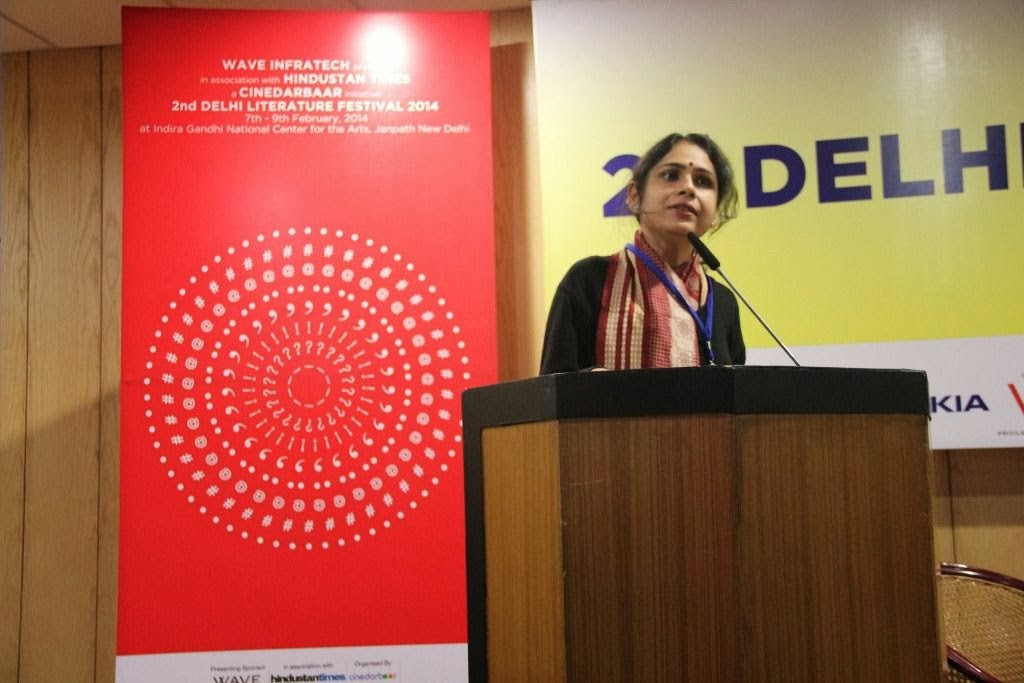The 2nd Edition of the Delhi Literary Festival, popularly known as Delhi Lit Fest (DLF), was recently held in Delhi. There were several discussions devoted to a wide variety of subjects. Given the large number of civil servants who have taken to writing, one session was devoted to the "Creative Pursuits of Civil Servants". The moderator was Mr.Bhaskar Ghose, who retired as Secretary to Government of India. I was part of the panel that also included Mrs.Vandana Kumari Jena, Secretary to Govt of India, Department of Land Records and Mrs.Sangeeta Gupta, Commissioner, Department of Income tax .
The session started at 11 am on 8 February, 2014 and despite it being a cold, overcast day, I was amazed to find a large number of people present in the auditorium. There were several others milling outside on the lawns, admiring the exhibits and book stalls.
The preliminary introductions were an eye opener. Mrs. Jena is a prolific writer, having penned more than 300 middles and a novel. Mrs. Gupta is a painter, writer and poetess, while Mr.Ghose has used his time after retirement to pen several books. Sharing the dais with such distinguished people made me feel extremely honoured.
Mr.Ghose flagged off the session by observing that there are 2 categories of civil servants. On a jocular note, he mentioned that after spending more than 30 years formulating categories and types for various government schemes, he could hardly desist from doing so today! Category A are those who write while in service, treading the fine line between work and passion, writing because one must and without compromising on the quality of work. And category B, are those who on attaining retirement, first write memoirs and then prescriptive books which express outrage against the system of which they are or were a part for several decades. My hunch is that he chose this line to open a discussion since all the other panelists were of category A and we would have bristled with anger if he had said anything else.
The discussion that followed felt decidedly au fait. Laments of being type-cast, branded or stereo-typed were heard from all speakers. The fear of being seen as a non-serious officer (since you preferred to write humorous middles, as Mrs.Jena did) or being seen as non-performing because you were not married to your work but had other interests, resulting in one trying to achieve double what others did (as Mrs.Gupta stated) were some of the observations.
An interesting nugget was shared by Mrs.Jena. She told the audience that as impressionable probationers, some well-meaning officer had advised them that with the passage of time, they should avoid metamorphosing into those driven to gasconade. Such persons are prone to starting every sentence with "When I was a DM/Collector…". To remain down-to-earth, it was suggested that one should cultivate and develop a hobby that one enjoys. Mrs.Jena modestly stated that since other art forms such as dance or music require some inherent talent, most people in her batch took to writing, since that was one skill that they were naturally adept at. And that is how she started on her voyage as an author.
As for my part, I happily admitted that for more than a decade I had remained a closet writer for fear of ridicule and being branded as the dreamy, writing-sorts. For in the IAS, writing is no longer considered the gold-dust that it used to be under its harbinger, the ICS. I remember that as a young officer, I found the earliest records of a district in the Gazetteers published by the British. Almost all of these were written by ICS officers. Apart from being treasure troves of information, these are delightful reads. Yet today, one thinks twice before disclosing one's alternate identity of being a cultural pretender.
On the whole, it was a delightful session where we took an unsuspecting audience by surprise and unburdened our heavy hearts on the travails of being a creative Civil Servant!
































































